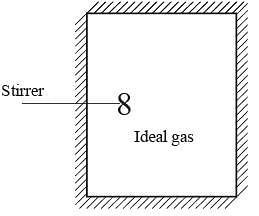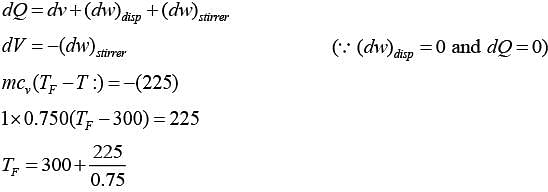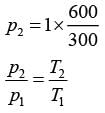Mechanical Engineering Exam > Mechanical Engineering Questions > Consider 1 kg of an ideal gas at 1 bar and 30...
Start Learning for Free
Consider 1 kg of an ideal gas at 1 bar and 300 K contained in a rigid and perfectly insulated container. The specific heat of the gas at constant volume Cv is equal to 750 J.kg-1.K-1 . A stirrer performs 225 kJ of work on the gas. Assume that the container does not participate in the thermodynamic interaction. The final pressure of the gas will be ___________ bar (in integer).
Correct answer is '2'. Can you explain this answer?
| FREE This question is part of | Download PDF Attempt this Test |
Most Upvoted Answer
Consider 1 kg of an ideal gas at 1 bar and 300 K contained in a rigid ...

From first law,

TF = 600 K
Since, rigid container (volume = constant),
∵ p ∝T

p2 = 2 bar Hence, the final pressure of the gas will be 2 bar.
Free Test
FREE
| Start Free Test |
Community Answer
Consider 1 kg of an ideal gas at 1 bar and 300 K contained in a rigid ...
Given data:
- Mass of the gas, m = 1 kg
- Pressure of the gas, P = 1 bar
- Temperature of the gas, T = 300 K
- Specific heat of the gas at constant volume, Cv = 750 J.kg^(-1).K^(-1)
- Work done on the gas, W = 225 kJ
Solution:
Step 1: Conversion of units
- 1 bar = 100,000 Pa (Pascal)
- 225 kJ = 225,000 J
Step 2: Calculation of initial internal energy
The internal energy of the gas can be calculated using the equation:
U = Cv * m * T
Substituting the given values, we get:
U_initial = 750 J.kg^(-1).K^(-1) * 1 kg * 300 K
= 225,000 J
Step 3: Calculation of final internal energy
The work done on the gas is given by the equation:
W = ΔU = U_final - U_initial
Where ΔU is the change in internal energy.
Rearranging the equation, we get:
U_final = W + U_initial
= 225,000 J + 225,000 J
= 450,000 J
Step 4: Calculation of final temperature
The final temperature of the gas can be calculated using the equation:
U_final = Cv * m * T_final
Rearranging the equation, we get:
T_final = U_final / (Cv * m)
= 450,000 J / (750 J.kg^(-1).K^(-1) * 1 kg)
= 600 K
Step 5: Calculation of final pressure
Since the container is rigid and perfectly insulated, the volume of the gas remains constant. Therefore, the final pressure can be calculated using the ideal gas law:
P * V = m * R * T_final
Where V is the volume of the gas and R is the specific gas constant.
Since the volume is constant, we can rewrite the equation as:
P_final = (m * R * T_final) / V
Since the container does not participate in the thermodynamic interaction, the volume remains constant. Therefore, we can simplify the equation as:
P_final = (m * R * T_final) / V
= (m * R * T_final) / (m * R)
= T_final
= 600 K
Converting the final pressure from Pascal to bar:
P_final = 600 K / 100,000 Pa/bar
= 6 bar
Therefore, the final pressure of the gas is 6 bar, which is not equal to the correct answer of 2 bar.
- Mass of the gas, m = 1 kg
- Pressure of the gas, P = 1 bar
- Temperature of the gas, T = 300 K
- Specific heat of the gas at constant volume, Cv = 750 J.kg^(-1).K^(-1)
- Work done on the gas, W = 225 kJ
Solution:
Step 1: Conversion of units
- 1 bar = 100,000 Pa (Pascal)
- 225 kJ = 225,000 J
Step 2: Calculation of initial internal energy
The internal energy of the gas can be calculated using the equation:
U = Cv * m * T
Substituting the given values, we get:
U_initial = 750 J.kg^(-1).K^(-1) * 1 kg * 300 K
= 225,000 J
Step 3: Calculation of final internal energy
The work done on the gas is given by the equation:
W = ΔU = U_final - U_initial
Where ΔU is the change in internal energy.
Rearranging the equation, we get:
U_final = W + U_initial
= 225,000 J + 225,000 J
= 450,000 J
Step 4: Calculation of final temperature
The final temperature of the gas can be calculated using the equation:
U_final = Cv * m * T_final
Rearranging the equation, we get:
T_final = U_final / (Cv * m)
= 450,000 J / (750 J.kg^(-1).K^(-1) * 1 kg)
= 600 K
Step 5: Calculation of final pressure
Since the container is rigid and perfectly insulated, the volume of the gas remains constant. Therefore, the final pressure can be calculated using the ideal gas law:
P * V = m * R * T_final
Where V is the volume of the gas and R is the specific gas constant.
Since the volume is constant, we can rewrite the equation as:
P_final = (m * R * T_final) / V
Since the container does not participate in the thermodynamic interaction, the volume remains constant. Therefore, we can simplify the equation as:
P_final = (m * R * T_final) / V
= (m * R * T_final) / (m * R)
= T_final
= 600 K
Converting the final pressure from Pascal to bar:
P_final = 600 K / 100,000 Pa/bar
= 6 bar
Therefore, the final pressure of the gas is 6 bar, which is not equal to the correct answer of 2 bar.
Attention Mechanical Engineering Students!
To make sure you are not studying endlessly, EduRev has designed Mechanical Engineering study material, with Structured Courses, Videos, & Test Series. Plus get personalized analysis, doubt solving and improvement plans to achieve a great score in Mechanical Engineering.

|
Explore Courses for Mechanical Engineering exam
|

|
Similar Mechanical Engineering Doubts
Consider 1 kg of an ideal gas at 1 bar and 300 K contained in a rigid and perfectly insulated container. The specific heat of the gas at constant volume Cv is equal to 750 J.kg-1.K-1 . A stirrer performs 225 kJ of work on the gas. Assume that the container does not participate in the thermodynamic interaction. The final pressure of the gas will be ___________ bar (in integer).Correct answer is '2'. Can you explain this answer?
Question Description
Consider 1 kg of an ideal gas at 1 bar and 300 K contained in a rigid and perfectly insulated container. The specific heat of the gas at constant volume Cv is equal to 750 J.kg-1.K-1 . A stirrer performs 225 kJ of work on the gas. Assume that the container does not participate in the thermodynamic interaction. The final pressure of the gas will be ___________ bar (in integer).Correct answer is '2'. Can you explain this answer? for Mechanical Engineering 2024 is part of Mechanical Engineering preparation. The Question and answers have been prepared according to the Mechanical Engineering exam syllabus. Information about Consider 1 kg of an ideal gas at 1 bar and 300 K contained in a rigid and perfectly insulated container. The specific heat of the gas at constant volume Cv is equal to 750 J.kg-1.K-1 . A stirrer performs 225 kJ of work on the gas. Assume that the container does not participate in the thermodynamic interaction. The final pressure of the gas will be ___________ bar (in integer).Correct answer is '2'. Can you explain this answer? covers all topics & solutions for Mechanical Engineering 2024 Exam. Find important definitions, questions, meanings, examples, exercises and tests below for Consider 1 kg of an ideal gas at 1 bar and 300 K contained in a rigid and perfectly insulated container. The specific heat of the gas at constant volume Cv is equal to 750 J.kg-1.K-1 . A stirrer performs 225 kJ of work on the gas. Assume that the container does not participate in the thermodynamic interaction. The final pressure of the gas will be ___________ bar (in integer).Correct answer is '2'. Can you explain this answer?.
Consider 1 kg of an ideal gas at 1 bar and 300 K contained in a rigid and perfectly insulated container. The specific heat of the gas at constant volume Cv is equal to 750 J.kg-1.K-1 . A stirrer performs 225 kJ of work on the gas. Assume that the container does not participate in the thermodynamic interaction. The final pressure of the gas will be ___________ bar (in integer).Correct answer is '2'. Can you explain this answer? for Mechanical Engineering 2024 is part of Mechanical Engineering preparation. The Question and answers have been prepared according to the Mechanical Engineering exam syllabus. Information about Consider 1 kg of an ideal gas at 1 bar and 300 K contained in a rigid and perfectly insulated container. The specific heat of the gas at constant volume Cv is equal to 750 J.kg-1.K-1 . A stirrer performs 225 kJ of work on the gas. Assume that the container does not participate in the thermodynamic interaction. The final pressure of the gas will be ___________ bar (in integer).Correct answer is '2'. Can you explain this answer? covers all topics & solutions for Mechanical Engineering 2024 Exam. Find important definitions, questions, meanings, examples, exercises and tests below for Consider 1 kg of an ideal gas at 1 bar and 300 K contained in a rigid and perfectly insulated container. The specific heat of the gas at constant volume Cv is equal to 750 J.kg-1.K-1 . A stirrer performs 225 kJ of work on the gas. Assume that the container does not participate in the thermodynamic interaction. The final pressure of the gas will be ___________ bar (in integer).Correct answer is '2'. Can you explain this answer?.
Solutions for Consider 1 kg of an ideal gas at 1 bar and 300 K contained in a rigid and perfectly insulated container. The specific heat of the gas at constant volume Cv is equal to 750 J.kg-1.K-1 . A stirrer performs 225 kJ of work on the gas. Assume that the container does not participate in the thermodynamic interaction. The final pressure of the gas will be ___________ bar (in integer).Correct answer is '2'. Can you explain this answer? in English & in Hindi are available as part of our courses for Mechanical Engineering.
Download more important topics, notes, lectures and mock test series for Mechanical Engineering Exam by signing up for free.
Here you can find the meaning of Consider 1 kg of an ideal gas at 1 bar and 300 K contained in a rigid and perfectly insulated container. The specific heat of the gas at constant volume Cv is equal to 750 J.kg-1.K-1 . A stirrer performs 225 kJ of work on the gas. Assume that the container does not participate in the thermodynamic interaction. The final pressure of the gas will be ___________ bar (in integer).Correct answer is '2'. Can you explain this answer? defined & explained in the simplest way possible. Besides giving the explanation of
Consider 1 kg of an ideal gas at 1 bar and 300 K contained in a rigid and perfectly insulated container. The specific heat of the gas at constant volume Cv is equal to 750 J.kg-1.K-1 . A stirrer performs 225 kJ of work on the gas. Assume that the container does not participate in the thermodynamic interaction. The final pressure of the gas will be ___________ bar (in integer).Correct answer is '2'. Can you explain this answer?, a detailed solution for Consider 1 kg of an ideal gas at 1 bar and 300 K contained in a rigid and perfectly insulated container. The specific heat of the gas at constant volume Cv is equal to 750 J.kg-1.K-1 . A stirrer performs 225 kJ of work on the gas. Assume that the container does not participate in the thermodynamic interaction. The final pressure of the gas will be ___________ bar (in integer).Correct answer is '2'. Can you explain this answer? has been provided alongside types of Consider 1 kg of an ideal gas at 1 bar and 300 K contained in a rigid and perfectly insulated container. The specific heat of the gas at constant volume Cv is equal to 750 J.kg-1.K-1 . A stirrer performs 225 kJ of work on the gas. Assume that the container does not participate in the thermodynamic interaction. The final pressure of the gas will be ___________ bar (in integer).Correct answer is '2'. Can you explain this answer? theory, EduRev gives you an
ample number of questions to practice Consider 1 kg of an ideal gas at 1 bar and 300 K contained in a rigid and perfectly insulated container. The specific heat of the gas at constant volume Cv is equal to 750 J.kg-1.K-1 . A stirrer performs 225 kJ of work on the gas. Assume that the container does not participate in the thermodynamic interaction. The final pressure of the gas will be ___________ bar (in integer).Correct answer is '2'. Can you explain this answer? tests, examples and also practice Mechanical Engineering tests.

|
Explore Courses for Mechanical Engineering exam
|

|
Suggested Free Tests
Signup for Free!
Signup to see your scores go up within 7 days! Learn & Practice with 1000+ FREE Notes, Videos & Tests.
























